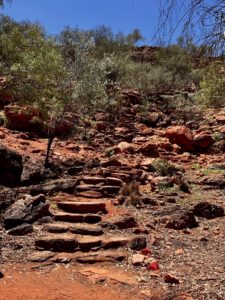
Launch of Olive Muriel Pink by Colleen Keating
Olive Muriel Pink is launched and here we are in this garden 47 years after Olive Pink’s passing. She would be thrilled! Thank you Anne. I am so pleased you accepted to launch my book. You bring a certain touch, an earthiness, a grounding of which Olive Pink would approve.
Olive Pink always stuns me with her innate capacity to stand her ground single-mindedly. Getting to know this amazing pioneer who called a spade a spade, we can only today admire her even if her voice often cried in the wilderness.
Her story could’ve been lost if people like Julie Marcus, Gillian Ward, Cheryl Kensett and yourself, Anne, had allowed her to be forgotten. Women have been lost down the centuries and whatever we can do to balance history, woman by woman we must do. Olive was strongly vocal about the ‘cult of forgetfulness’ where what was was done to the Indigenous people was being erased from memory, where the history of dispossession and destruction of lands and water holes was being obliterated from the national narrative. So the least we can do is hold this story up for all.
As you will read in my introduction it has been a 12 year dream to bring this poetic journey of Olive to reality.
I would like to make special mention of Ginninderra Press. Thanks to Brenda and Stephen Matthews AOM who are invaluable to poetry and poets. and I say thank you for believing in me and publishing this new book.
Praise must go to the board of Trustees and the current dynamic curator Ian Coleman, and the Bush-care groups who stay true to the mission of conservation, education, sustainability and research of Miss Pink’s ‘Gallant ones ‘ as she described the vulnerable arid flora of Central Australia. Thank you Ian for your hospitality. and for this festival here for us to have space and time to bring Olive Pink alive.
The indigenous poet Oodgeroo Noonuccal, says
“The past is not dead. It is all around us and within”
I believe we can only suppress things for so long. It ultimately seep through cracks, it breaks down seams, splits open, as Leonard Cohen sings “There’s a crack in everything: thats how the light gets in”
And here we are searching for the light, our history, to accept and learn and grow as a people, as Australians.
From her early years Olive was aware of speaking up and calling out injustice. This sometimes got her offside with the powers that be.
When her work as an anthropologist was thwarted and she was at a low and lonely time her vision turned to the arid plants and their loss and so because of her new vision we have the legacy of this natural wonderland.
Peter Latz knew her He said in 2015 “She was very fiery. I admired her because she was an early feminist and kept everybody on their toes. But she was a bit of a prude.
I think that says it all. . And of course she was eccentric and difficult. which later in her life she was quite proud of. She loved the fact that ‘magistrates kept an interpreter on hand “just in case Miss Pink is around”
She wrote thousands of letters to ministers, governors, prime minister, to the papers and many were afraid of her because they didn’t want to be offside with her One story that I thought you would appreciate . . one day she met a young Warlpiri man here on the Todd. She had known him as a boy. and he had just been released from gaol and he was bashed and in pain and Olive stomped back up to the magistrate and demanded to inspect the gaol and he refused. So she worked out a plan . A fine or prison page 214
I like to think of this Poetic Journey as a bridge thrown over a stream of time which unites the last century’s history and today, for it is written about a woman in a time when patriarchy and racism were not being called out. It is a story of a woman who could be called a radical, a troublesome woman who would not accept the norm who set out hopefully in this life and experienced its struggles. Against the adversity and all the odds she lived her life to the full.
To finish I will share: a garden poem page 249 My own Papinya
And here we are.
Before he died Minister Hasluck reminisced about Mis Pink and how she planted trees
giving them names of ministers and if she was not happy with their policies she wouldn’t water them and Gov. Paul Hasluck said sometimes he took a peep at the Mr Hasluck tree to make sire it looked in good health.
This last poem I hope takes you back to autumn 1975 a month before her passing. page 274
Olive loved to sit and chat with friends with a pot of tea, and Madeira cake and sometimes a sherry. now it is time for us to celebrate her.
Her legacy is all around us. I hope in the next few days you have the opportunity to take time to enjoy a pioneer walk with Ian Coleman and and some of us to enjoy the beauty and peace of this garden.
Thank you all for being here , supporting Olive and showing your interest . One can not ask for anymore.

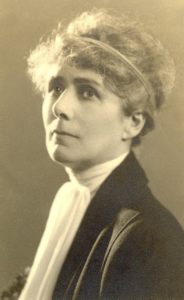
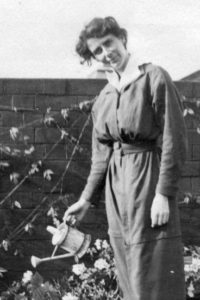
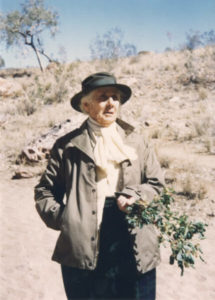

Compulsive Reader
A review of Olive Muriel Pink by Colleen Keating
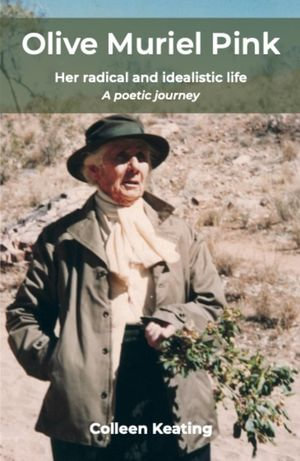 Reviewed by Beatriz Copello
Reviewed by Beatriz Copello
Olive Muriel Pink
Her radical and idealistic life
A poetic journey
Colleen Keating
Ginninderra Press
3rd September 2021, ISBN: 9781761091599, 320 pages, paperback, $40
I do not think there is a better way to honour a woman of the calibre of Olive Muriel Pink than to write a book of poetry about her life. Colleen Keating has done just that, she has written a poetic journey about this unsung Australian heroine.
With a sharp eye and lyric touch, the world of Olive Pink becomes alive, it is a passionate story told with knowledge. It is evident that the poet has invested years researching the life of Olive Pink. The poet says: “I have been researching, writing and thinking about Olive Pink for over a decade now. The discoveries that come along the way – the portraits unveiled – are very stirring.”
This collection covers many years in the life of Pink, it starts in 1884 and finishes in 1975. The book also has a foreword, a prologue and a chronology as well as notes and bibliography. The labour of love that went into writing this book would grant the author a doctorate.
The author in Notes explains that she aimed to write a book that fell between an accurate scholarly presentation of Olive Pink’s life and her own personal interpretation of it.
Olive Pink was a fighter for justice who advocated for the rights of First Nations People, she was also an anthropologist, artist and gardener. Keating from the first poem in the book alerts the readers about what they will encounter throughout the pages, in this excerpt from “Olive the pioneer” she writes:
Who is Olive?
She defied the silence
caused discomfort
annoyed the authorities.
Her letters shouted from the edge.
She heard budgerigar dreaming
and drummed to a different tune.
She pushed against the colonial tide.
If the answer is ‘eccentric’
in her death she will be twice dismissed.Who is Olive? History asks.
She broke the silence
her voice for the voiceless
remembered the forgetting.
She visioned justice in the courts.
Her feet knew country.
She carried red dust
under the fingernails of her heart.
She listened to elders, learnt language
wrote down stories, sketched arid plants
medicinal, nutritional, ritual.
If the answer is ‘anthropologist’
in her death she will be twice honoured.
If Keating wrote music, I would say she does not miss a beat, when she raises issues about Olive’s past, she does it with conviction and poignant comments, like in the following excerpt from “A new lodestone”:
The grim spectre of injustice
towards Aboriginal tribe
taunts Olive out of her grief
jolts her from self pity.
Like a silk petticoat pulled over her hair
the air is static in its darkness.
It bleeds through a colander of whitewash words
- progress jobs, growth.
Its handprint blood-red.
The poet also utilizes very vivid imagery, the readers become Olive, we can see, smell, hear what she experiences. Keating appeals to the senses, the following poem “Restless” illustrates this:
In her dingy office Olive yearns
for the vast open country, large skies,
hazy horizons, a slung kettle hissing
and spitting its leak over the fire.
Burnt flesh and sizzle
of goanna still fill her nostrils.
Olive walks country in her sleep –
the pungent smell of camels
sweaty bodies, blazoned glare, flies
dust-blown storms.
That red dust under
the colour of her heart
and patter of Pitjantjatjara children
still running giggling beside her
lingers like the balm of an Indian summer.
The poet has the skill to write about Olive’s powerful emotions without sentimentality or corniness, through these strong emotions readers can form a picture in their mind of Olive’s personality. The following excerpt from the poem titled “Heady days” is a good example of the Keating’s ability:
Olive is energised by academia.
The scissor-cut horizon
of her desert experience
challenges like a mirage.
She seizes every chance to argue,
‘The root cause is not malnutrition or disease –
They camouflage facts, treat the wrong symptoms.’
Heated discussion rises.
Angrily she fights for breath.
‘Even the most ignorant know the problems –
White man’s aggression, sexual abuse
fear, venereal disease, land dispossession.
We like to deride these facts.’
She flushes, her neck prickles as she continuous,
‘Full-bloods need their own protected country
not mission reserves.’
Her tone is strident.
‘Daily handouts from stations
Keep them tied to white man power.’
Olive Pink struggled all her life to be able to do what men were able to do, in the following poem “High Hopes” Keating captures this desire but also very cleverly imagines her mood in such a difficult situation.
Over dinner her enthusiasm bubbles.
‘After my thesis I plan
a full year of research among the Arrernte’
she confidently tells the Professor
and others grouped around the table.
‘I would like to be included
in your next museum expedition.
It will reduce my research expenses
and my anthropology will enhance the group.’
Silence.
Unease around the room
as lightening awaits a clap of thunder.
Awkward shifts and exchanged glances
the embarrassed clearing of throats.
From her left in a deep tone,
‘That would not be possible …
‘But you took Ted Strehlow on your trip last year!’
‘… for a woman,’ mumbles the professor.
Exposed, Olive’s heart races.
She hopes they don’t notice the burn
of her cheeks.
She avoids eye contact
gazes out as one with miles to go
restless to be on her way.
She needs desert air.
‘Why does gender cause such heart break?’
she broods into the night.
‘Why wasn’t I born a man.”
I would like to congratulate Colleen Keating not only for writing this incredible book but also for honouring a woman from the past which like many other Australian heroines are often forgotten or not given credit for their achievements. Reading about Olive Muriel Pink will inspire you and give you strength to struggle to achieve your aims.
About the Reviewer: Dr Beatriz Copello is a former member of NSW Writers Centre Management Committee, she writes poetry, reviews, fiction and plays. The author’s poetry books are: Women Souls and Shadows, Meditations At the Edge of a Dream, Flowering Roots, Under the Gums Long Shade, and Lo Irrevocable del Halcon (In Spanish). Beatriz’s poetry has been published in literary journals such as Southerly and Australian Women’s Book Review and in many feminist publications. She has read her poetry at events organised by the Sydney Writers Festival, the NSW Writers Centre, the Multicultural Arts Alliance, Refugee Week Committee, Humboldt University (USA), Ubud (Bali) Writers Festival.
* * * * * * * * * * * *
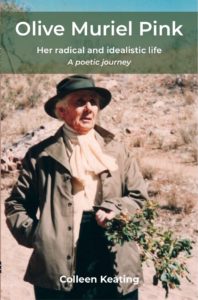
It is exciting to have in my hand my new poetic journey published by Ginninderra Press.
Olive Muriel Pink: her radical and idealistic life.
This is the story of a remarkable Australian woman anthropologist, artist, activist, and especially Aboriginal advocate. She was a trailblazer who lived on the edge, exposed raw truth as witness to the turbulent first 75 years of the 20th century. Olive lived till 91 from 1884 –1975. So her life overlaps with some of us. I am hoping, everyone especially our young women get to know her as one of our Australian heroines.
She was a woman warrior till her last breath and the saying “bad things happen when good people do-nothing” could never apply to Olive Pink. For she was a passionate visionary and worked for her beliefs, despite great adversity and many set backs. You are going to love this story. After you experience it you will want to share it and buy it for your friends .

Here is one more woman documented as we reclaim our women from history for history one by one. There are many more women we need to write about, sing about, dramatise , make films, documentaries and TV shows and podcast so we can never say again ‘history is a about men written by men for men.
I chose two words for my title radical and idealistic . There is a juxtaposition in these two words radical meaning someone who advocates for political and social change . Then at the same time idealist meaning she dreamed sometimes too close to perfectionism perhaps unrealistic.
As a radical she was one of the very early women to study Anthropology at Sydney University.

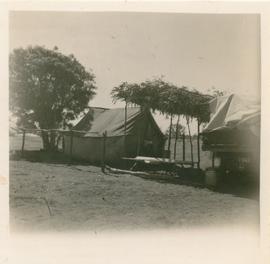
She received grants to live and work with the Warlpiri people , north of Alice Springs and when she could no longer work as an Anthropologist she became a welfare worker in Alice Springs and spent a lot of time supporting the young Warlpiri and Arrernte men before the courts especially where she considered that tribal (lore)law and custom were not being taken into account. She would call out and demand rights for the young men who could not speak English and mostly did not know why they were brought in. Magistrates were afraid of her and made sure they had interpreters when she was around.
One humorous story – she demanded to visit the prison as she heard stories of the poor conditions. Refused, because they knew she would write about it to the papers, she disrupted court even louder after her caution, enough to get a fine or 5 days in prison. When she refused to pay the fine. the magistrate rang the gaol warden to tell him ‘that nosey Miss Pink’ was coming to prison. The warden jumped in his 1950’s jalopy and raced down to the court house to pay the fine not wanting her near his gaol .
Every day the pen was her sword. Besides calling out the legal system she sent out letters to the Governor of NT. letters to the Prime Minister of the day, letters to the newspapers and she sent urgent telegrams where she felt it necessary.
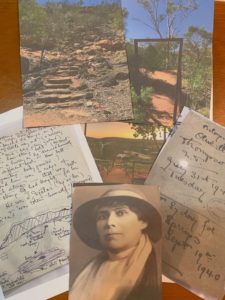
I was privileged to do my research at the Australian Aborigine and TorresStrait Islander Institute in Canberra where I spent days with access to 22 boxes of her papers, letters, diaries, calendars (she painted). I found further papers at Darwin Parliament Library and Central Library in South Australia.
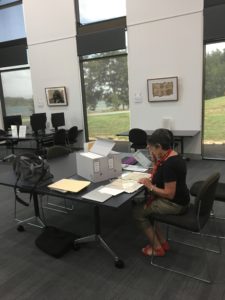
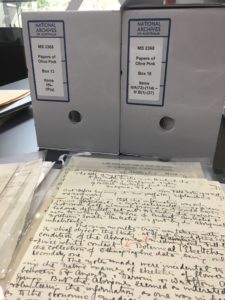
Then at the same time she was an idealist . . she dreamed of perfection. One realises her goals were grand and often unrealistic. She was fighting against the tides of progress, the opening up of the inland, the economy , political decisions, stolen land for cattle stations, mining, missions, the reserves, the soldiers racing up and down on the new road opening up Darwin in the 1940’s. and always a fearsome advocate against male treatment of the Indigenous women.
Olive Pink is a witness to this world that is our history and it is good to have it recorded as background to her story.
Finally quite ostracised because of her radical thinking she moved over the Todd River to a degraded common . Here she suddenly thought was a great place to fence off and protect the native flora that was disappearing. She finally over two years had the land gazetted by the then Governor Paul Hasluck.
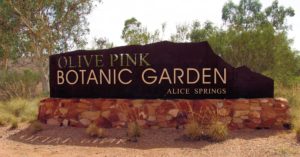
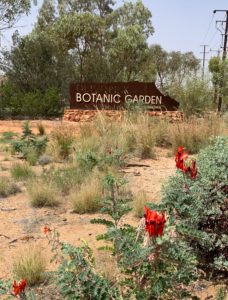
In 1956 , Olive, now 71 years of age , when most of us would consider retiring, became the first woman curator of the first Arid Botanic Garden in the world. (defined by a rainfall below 13 inches). She employed Warlpiri gardeners and made sure they were properly payed. For the next 20 years she worked to create an eco-friendly garden with its own water system.
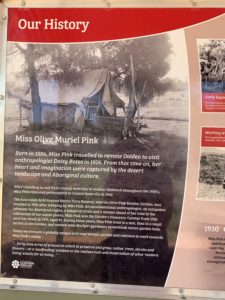
She lived in the garden as curator till her death in 1975.
Today the OPBG has over 600 Central Australian plant species, 148 of these occur naturally within the rocky hill habitat. There are also 40 rare and threatened species Acres of walking tracks taking visitors around the garden and up the Hill where great views overlook Alice Springs, the Todd River and the MacDonnell Ranges. There are self guided walks and learning stations for the visitors, Bird watching and wildlife Native euros (wallabies) and rare black footed wallabies live in the garden. 
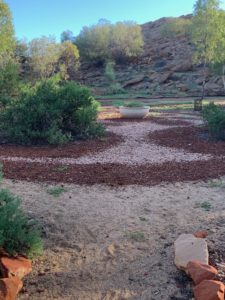
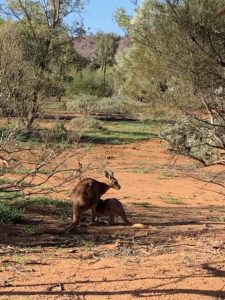
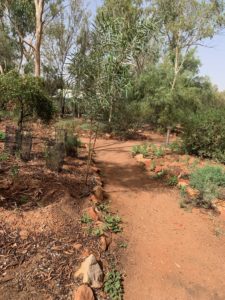
The Bean Tree Cafe where I had a date in September to launched my last poetry collection set in the Kimberley and the far north, called Desert Pattern and was supposed to be there layer this month to launch this book, is very popular with locals and tourists.
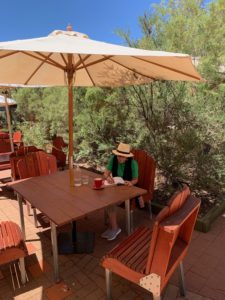
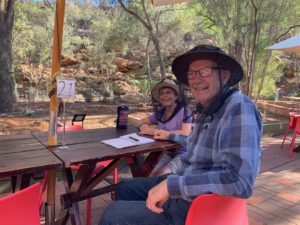
Described as ‘indomitable’ and ‘unforgettable’, Miss Pink is someone who evoked contradictory opinions –
A difficult and eccentric woman
A visionary and fiercely dedicated to the Aboriginal cause
Scourge of politicians – some calling her Public Enemy No 1
The first woman land rights advocate
A communist
An early conservationist of native flora
All said Olive Muriel Pink is one of Alice Springs’s most colourful characters a noted pioneer of the Territory and a great Australian.
